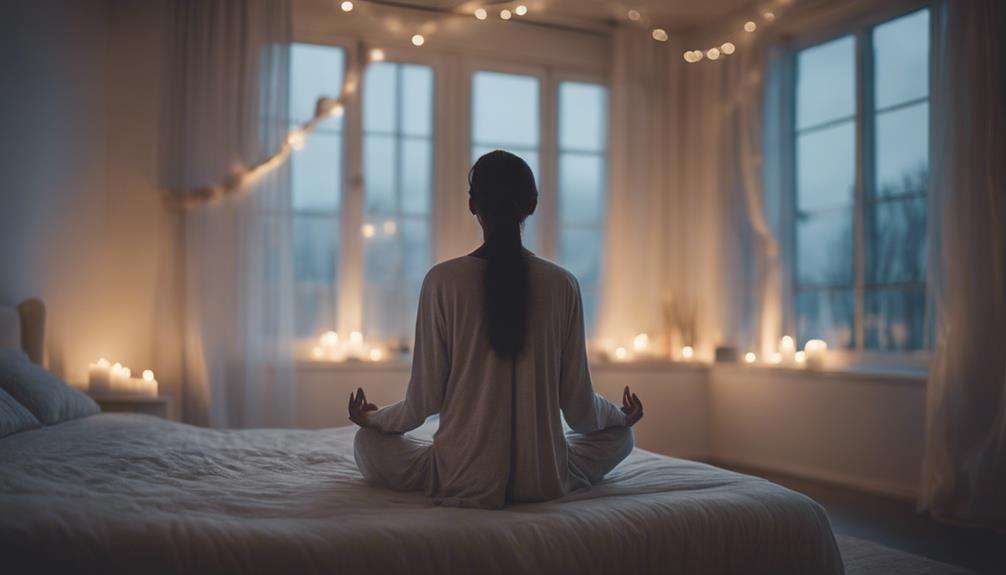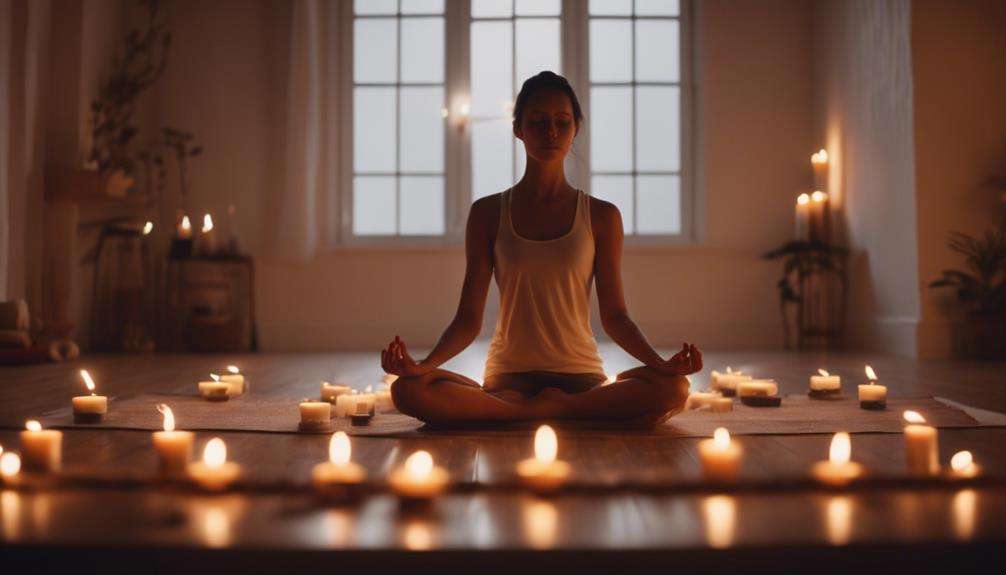When it comes to achieving a restful night's sleep, think of meditation techniques as the gentle lullabies that guide your mind into a tranquil slumber.
But how exactly can these techniques pave the way for deeper and more restorative sleep?
By exploring the intricacies of each method and understanding how they can soothe your mind and body, you may uncover a path to restful nights and energized mornings.
Key Takeaways
- Body-centered meditations enhance relaxation and prepare for restorative sleep.
- Breath-focused meditations regulate physical responses and improve sleep quality.
- Visualization practices reduce stress levels and create a calm mental environment for better sleep.
- Emotion-centered meditations foster emotional well-being and promote deeper, more restorative sleep.
Body Scan Meditation
To enhance your relaxation and promote better sleep, consider practicing body scan meditation, focusing on systematically releasing tension in different parts of your body. Body scan meditation is a powerful technique that can help you cultivate awareness of your body and mind. By bringing your attention to each body part, you can identify areas of tension and consciously release them, promoting relaxation and reducing physical discomfort. This practice not only alleviates stress but also calms the mind, preparing you for a restorative sleep experience.
Engaging in body scan meditation before bedtime can facilitate a deep sense of relaxation, enhancing mindfulness and reducing anxiety. By incorporating this practice into your nightly routine, you create a conducive environment for deep, restorative sleep. Paying attention to each part of your body allows you to let go of the day's tension, promoting a state of calm that's essential for a peaceful night's rest. Try integrating body scan meditation into your bedtime ritual to experience the benefits of improved sleep quality and overall well-being.
Progressive Muscle Relaxation
Feeling tense and restless before bed? Progressive Muscle Relaxation could be your ticket to a more peaceful night's sleep.
By systematically tensing and releasing muscle groups, you can unwind and prepare your body for deep relaxation.
Ready to release muscle tension and practice a relaxation sequence for better sleep?
Muscle Tension Release
When it comes to releasing muscle tension and promoting relaxation, Progressive Muscle Relaxation offers a structured approach by systematically engaging and then relaxing different muscle groups. This therapy technique is a powerful tool for reducing stress, managing anxiety, and improving sleep quality. By practicing Progressive Muscle Relaxation, you can experience deep relaxation and alleviate physical discomfort.
Here are some key benefits of this technique:
- Reduces stress and promotes relaxation
- Aids in anxiety management
- Improves sleep quality
Progressive Muscle Relaxation is an evidence-based method that can help you prepare your body for restorative sleep by calming the nervous system and releasing physical tension. Start incorporating this technique into your bedtime routine for a more restful night's sleep.
Relaxation Sequence Practice
Engage in a relaxation sequence practice known as Progressive Muscle Relaxation to unwind and release physical stress for better sleep quality.
Progressive Muscle Relaxation (PMR) is a proven relaxation technique where you tense and then relax different muscle groups in your body. By practicing PMR, you can reduce muscle tension, alleviate stress, and promote deeper relaxation, all of which are essential for achieving restorative sleep.
Research supports that PMR can lower anxiety levels, decrease physical tension, and enhance overall feelings of calmness. By calming the nervous system through systematic muscle tensing and releasing, PMR prepares your body for a night of better sleep.
Embrace this stress-reducing technique to achieve a state of tranquility and deeper relaxation, paving the way for a restful night's sleep.
Breath-Focused Meditation

By focusing on your breath, you can effectively calm your mind and body through breath-focused meditation. This technique involves concentrating on the inhalation and exhalation patterns to promote relaxation and deep relaxation.
Here's why breath-focused meditation can help improve your sleep quality:
- Reduces Racing Thoughts: By anchoring your attention on the breath, you can reduce racing thoughts that often keep you awake at night.
- Regulates Physical Responses: Breath-focused meditation is effective in regulating heart rate and lowering blood pressure, creating a conducive environment for restful sleep.
- Enhances Mindfulness: This practice helps cultivate mindfulness, allowing you to stay present in the moment and prevent your mind from wandering to stressful thoughts.
Incorporating breath-focused meditation into your bedtime routine can be a simple yet powerful method to calm the mind, enhance relaxation, and ultimately improve the quality of your sleep.
Visualization Meditation
When practicing visualization meditation, you'll create clear mental images to guide your relaxation journey. By engaging your imagination in this way, you can find a peaceful escape from stress and anxiety.
Try incorporating guided imagery techniques to enhance your meditation experience and promote better sleep.
Clear Mental Images
To enhance your relaxation and promote restful sleep, immerse yourself in creating vivid mental images of peaceful scenes through visualization meditation. This technique focuses on calming the mind by delving into detailed imagery, helping reduce stress and anxiety, thus leading to improved sleep quality.
By engaging in visualization meditation, you can guide your brain towards a tranquil state conducive to a restorative sleep experience. Research highlights the effectiveness of this method in aiding individuals to shift their attention away from intrusive thoughts, replacing them with positive and soothing mental environments.
Embrace the power of visualization to create a peaceful sanctuary within your mind, paving the way for a restful and rejuvenating night's sleep.
- Calming the mind through vivid imagery
- Reducing stress and anxiety levels
- Improving overall sleep quality
Relaxation Through Imagination
To cultivate a state of relaxation and foster better sleep, engage in visualization meditation by immersing yourself in vivid mental images of tranquil settings. Picture yourself in peaceful scenes like a calming beach or serene forest to calm your mind and reduce stress and anxiety. Research suggests that visualization meditation can significantly improve sleep quality by allowing you to let go of worries and prepare your mind for restorative sleep.
Regular practice of visualizing positive scenarios before bedtime not only enhances emotional balance but also promotes mental clarity and inner peace. By incorporating visualization meditation into your routine, you can experience the benefits of reduced stress, improved sleep quality, and a sense of emotional equilibrium.
Guided Imagery Practice
Engage in guided imagery practice, a powerful form of visualization meditation that can enhance relaxation and improve the quality of your sleep.
- Redirect your focus: Guided imagery helps in reducing stress and anxiety by shifting your attention to peaceful mental scenes.
- Enhance well-being: Research indicates that visualization meditation can lower cortisol levels, decrease heart rate, and promote overall wellness for better sleep.
- Create a serene atmosphere: By engaging your senses and emotions, guided imagery cultivates a calming and tranquil environment conducive to deep restorative sleep.
Immerse yourself in this practice before bedtime to prepare your mind for a restful night's sleep, leading to waking up more rejuvenated and refreshed in the morning.
Mindfulness Meditation
Mindfulness meditation, a practice focusing on the present moment without judgment or attachment to thoughts, can significantly improve your sleep quality and reduce insomnia symptoms. By engaging in mindfulness meditation before bedtime, you can calm your mind, reduce stress, and enhance relaxation, setting the stage for a restful night's sleep.
Research indicates that this meditation technique is associated with decreased cortisol levels, creating a state of relaxation that's conducive to falling asleep easily. Regular practice of mindfulness meditation not only helps in improving sleep quality but also increases your awareness of thoughts and emotions, leading to better emotional regulation and overall well-being.
Loving-Kindness Meditation

As you shift your focus from mindfulness meditation to the practice of loving-kindness meditation, you embark on a journey of cultivating feelings of love, compassion, and kindness towards yourself and others. This form of meditation, also known as Metta meditation, involves repeating phrases or mantras that promote well-being and positive intentions for all beings. Research suggests that loving-kindness meditation can reduce symptoms of anxiety, increase empathy, and enhance social connections.
Incorporating loving-kindness meditation into your bedtime routine can have a profound impact on your emotional well-being and quality of sleep. Here are some reasons why you should consider integrating this practice into your nightly ritual:
- Enhances emotional regulation
- Fosters a sense of interconnectedness
- Promotes restorative sleep
Gratitude Meditation
Incorporating gratitude meditation into your nightly routine can significantly improve your emotional well-being and quality of sleep. By focusing on things to be thankful for, gratitude meditation fosters positive emotions, reduces stress levels, and enhances mental health.
Research indicates that practicing gratitude meditation can lead to overall well-being improvements, better sleep quality, and a positive mood. Cultivating gratitude before bedtime may help you experience deeper sleep, decreased anxiety, and an uplifted mood. This practice shifts your focus from worries to blessings, promoting relaxation and contentment before sleep.
Regular gratitude meditation can help create a positive mindset, which in turn can result in better sleep, increased resilience, and emotional balance. By incorporating gratitude meditation into your nightly routine, you're not only improving your sleep but also nurturing your mental health and overall well-being.
Frequently Asked Questions
How Do You Meditate for Deep Sleep?
To meditate for deep sleep, start with calming breathing exercises. Follow with guided imagery and progressive muscle relaxation. Engage in mindfulness meditation, body scan, and visualization techniques. Consider trying yoga nidra for a restful night.
What Meditation Is Best for Sleep?
For better sleep, focus on sleep hygiene, relaxation exercises, the mind-body connection, guided imagery, progressive muscle relaxation, breathing techniques, and sleep meditation. These practices can calm your mind and body, promoting restful sleep.
What Is Deep Sleep Meditation Called?
Deep sleep meditation is called yoga nidra. It's like 'yogic sleep.' This practice guides you into deep relaxation and awareness. It's known for promoting restorative sleep by calming your system. Try it for better sleep!
Does Meditation Reduce Deep Sleep?
When you meditate, you're not just reducing stress; you're enhancing sleep quality. Deep sleep isn't compromised; it's nurtured. Your brain waves sync, stress fades, and melatonin flows, crafting a serene path for restorative slumber.
Conclusion
As you drift off into a peaceful slumber, remember the power of meditation in enhancing the quality of your sleep.
By incorporating these techniques into your bedtime routine, you can calm your mind, relax your body, and experience deeper restorative sleep.
Embrace the serenity and mindfulness that meditation brings, and let it guide you into a night of rejuvenating rest.
Sweet dreams await with the power of meditation by your side.






